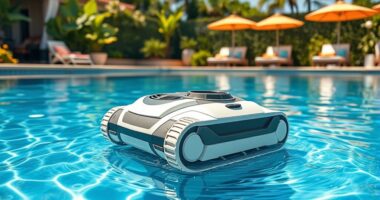Many believe automatic pool cleaners can fully replace manual cleaning and require no maintenance, but that’s not true. They aren’t foolproof, and regular upkeep is needed to keep them functioning well. Not all cleaners are suitable for every pool type or debris load. Relying on them without proper setup or supervision can cause issues. If you’re curious about these misconceptions and how to get the most out of your cleaner, there’s more to learn.
Key Takeaways
- Automatic pool cleaners do not replace manual cleaning; they only handle surface skimming and accessible areas.
- They do not control chemical levels or sanitize water, requiring manual maintenance to prevent algae and cloudy water.
- Mechanical issues like sensor faults or motor wear can occur, affecting performance despite proper maintenance.
- Larger or irregular-shaped pools may need specific cleaners; not all models suit every pool type or debris load.
- Initial cost isn’t the only expense; ongoing maintenance, repairs, and energy use impact long-term value.
Automatic Pool Cleaners Can Replace Manual Cleaning Entirely

Many people assume that automatic pool cleaners can eliminate the need for manual cleaning altogether, but this isn’t entirely accurate. While these devices do a great job removing debris from the pool floor and walls, they can’t handle everything. Manual intervention is still necessary for tasks like skimming surface debris that floats or cleaning hard-to-reach corners. Additionally, maintaining proper chemical balance is vital for keeping your pool safe and clear. Automatic cleaners don’t control chemical levels or sanitize the water, so neglecting manual cleaning and chemical checks can lead to algae growth and cloudy water. Relying solely on an automatic cleaner gives a false sense of security, but a combination of manual cleaning, chemical maintenance, and the cleaner’s use ensures your pool stays pristine. Proper pool maintenance involves regular inspection and care beyond what an automatic cleaner provides. Regular water testing is essential to ensure chemical levels are balanced and the water remains safe for swimming. Incorporating advanced cleaning techniques can further optimize your pool upkeep and prevent issues before they arise. Recognizing the importance of preventative maintenance helps avoid costly repairs and extended pool downtime.
They Are 100% Foolproof and Require No Maintenance

Many believe automatic pool cleaners are completely foolproof and require no upkeep, but that’s not true. Hidden mechanical issues can still occur, and regular maintenance is essential to keep them running smoothly. Ignoring these needs can lead to unexpected breakdowns and costly repairs. For example, routine inspections can help identify potential problems before they cause major malfunctions. Additionally, understanding the mechanical components involved can help owners troubleshoot minor issues without professional assistance. Properly maintaining automated cleaning systems ensures longevity and optimal performance over time, especially since refrigerant levels and other critical parts may degrade without proper care. Regularly checking and cleaning filters and brushes can also prevent buildup and improve efficiency.
Hidden Mechanical Issues
Despite claims that they are entirely foolproof, hidden mechanical issues can still arise in automatic pool cleaners, often catching you off guard. Sensor faults are a common problem, causing the cleaner to misjudge obstacles or miss areas altogether. These faults can lead to inefficient cleaning cycles or complete failure to operate. Motor wear is another hidden issue that can develop over time, resulting in reduced suction power or the motor overheating. Since these problems aren’t always obvious, you might think your cleaner is functioning perfectly when it’s actually struggling behind the scenes. Ignoring these mechanical issues can lead to costly repairs or early replacement. Regular inspection of sensors and motors, even if the cleaner appears to work fine, helps prevent unexpected breakdowns and ensures your cleaner stays in top shape. Additionally, some mechanical components may become misaligned or damaged, further impairing performance over time. Being aware of on-device AI capabilities can help in troubleshooting, as smarter cleaners may alert you to potential issues before they become serious.
Regular Maintenance Needed
While some automatic pool cleaners are marketed as completely foolproof and maintenance-free, in reality, they still need regular care to work at their best. You’ll want to check and replace the filter periodically to prevent clogs and guarantee *ideal* suction. Neglecting filter replacement can reduce cleaning efficiency and strain the motor. Additionally, battery lifespan is a key factor; over time, batteries will weaken, requiring recharging or replacement to keep the cleaner running smoothly. Regular maintenance also includes inspecting brushes and wheels for wear. By staying on top of these tasks, you’ll extend your cleaner’s lifespan, reduce unexpected breakdowns, and enjoy a cleaner pool without hassle. Remember, even the most advanced cleaners need some attention to deliver consistent results. Proper couple communication about maintenance routines can help ensure your pool cleaner stays in top condition. Regularly reviewing the filter maintenance guidelines and understanding the mechanical components involved can further improve your cleaner’s performance and longevity. Paying attention to routine inspections can help identify issues early before they become costly repairs. Incorporating sensor diagnostics can also help detect performance issues early, preventing more significant problems later on.
All Automatic Cleaners Are Suitable for Every Pool Type

Not all automatic pool cleaners are suitable for every pool type, so you need to choose carefully to guarantee the best performance. Your pool’s size and shape substantially influence which cleaner works best. For larger pools, a robotic cleaner with a longer battery life or a robust suction system is essential to cover the area efficiently. If your pool has an irregular shape, a cleaner with flexible navigation capabilities will adapt better to complex contours. Conversely, simple shapes and smaller sizes might do well with basic models. Always consider your pool’s specific requirements before purchasing. Using the wrong type of cleaner can lead to poor cleaning results and wasted investment. Additionally, understanding home improvement principles can help you optimize the overall pool area for easier maintenance and better longevity. Incorporating automatic cleaning systems into your pool maintenance routine can also reduce manual effort and ensure consistent cleanliness. Selecting the right cleaner also involves considering pool surface types, as different surfaces may require specialized brushes or cleaning methods to prevent damage.
They Can Handle Large Debris and Heavy Dirt Effortlessly

Many automatic pool cleaners are built to tackle large debris and heavy dirt with ease, making them a practical choice for pools that frequently accumulate leaves, twigs, or mud. These cleaners often feature powerful suction or strong brushes designed to lift large debris from the pool floor and walls. Heavy dirt, like mud or silt, can also be removed efficiently, reducing manual cleaning time. Additionally, high-capacity filters are common in many models to enhance debris collection. Understanding the signs and symptoms of heavy dirt buildup can help you determine when to use these powerful cleaners. Regularly inspecting your pool for debris accumulation can prevent clogging and maintain optimal cleaning performance. However, while they excel at handling big messes, some models may struggle with very fine dirt or stubborn debris. It’s important to choose a cleaner suited to your pool’s typical debris load. Keep in mind, no cleaner can do everything perfectly, but many are designed specifically to manage large debris and heavy dirt effectively.
Automatic Cleaners Are Always the Most Cost-Effective Solution

Automatic pool cleaners often seem like the most cost-effective choice upfront, but that’s not always the case. A thorough cost comparison reveals that initial purchase price is just part of the equation. Maintenance frequency plays a significant role—some models require more frequent filter cleanings or parts replacements, which can add up over time. Cheaper cleaners may save you money initially but could lead to higher ongoing costs due to frequent repairs or less efficient cleaning. Additionally, energy consumption varies; some automatic cleaners use more power, increasing your utility bills. Before investing, consider not just the upfront cost but also the long-term expenses involved in maintenance and operation. Regularly assess performance efficiency to ensure you’re getting the best value for your investment over time. Factors like long-term durability are essential to consider when choosing a cleaner that balances initial cost with ongoing expenses.
They Can Operate Effectively Without Proper Setup or Supervision

Proper setup and supervision are essential for automatic pool cleaners to work effectively. Without careful attention, setup mistakes can lead to poor cleaning results or equipment damage. Supervision importance can’t be overstated—leaving your cleaner unchecked may cause it to miss spots or get stuck. When you neglect proper setup, you risk:
- Incorrectly attaching the hose or power supply
- Failing to clear debris from the pool floor beforehand
- Overlooking the need for proper filter maintenance
- Ignoring signs of wear or malfunction during operation
- Running the cleaner without monitoring for extended periods
These issues highlight why setup mistakes happen and why supervision matters. Relying on your pool cleaner without proper setup or oversight won’t deliver the best results and might even shorten its lifespan.
Frequently Asked Questions
Can Automatic Pool Cleaners Clean Algae and Bacteria Effectively?
Automatic pool cleaners are great for keeping your pool clean, but they primarily focus on removing debris and dirt. For algae removal and bacterial eradication, you still need to maintain proper chemical levels and shock your pool regularly. While some advanced models may help circulate water better, they don’t replace chemical treatment. So, use your cleaner alongside proper sanitation to guarantee your pool is truly clean and safe.
Do Automatic Pool Cleaners Work Better With Certain Pool Shapes?
You might notice that certain pool shapes, like rectangular or kidney-shaped pools, can impact cleaning efficiency. Automatic pool cleaners tend to work better with simple, symmetrical shapes because they cover the surface more thoroughly. Irregular or complex pool shapes may require extra effort or specialized cleaners to make sure of complete coverage. So, your pool’s shape can influence how well the cleaner performs, making it important to choose the right model for your pool.
Are Automatic Cleaners Compatible With Saltwater Pools?
Did you know that over 60% of pool owners prefer automatic cleaners? Yes, they’re compatible with saltwater pools, making maintenance easier for you. Saltwater compatibility means your cleaner can handle the slightly corrosive environment without issues. Just keep in mind the maintenance requirements—regularly check and clean your cleaner to guarantee peak performance. So, yes, automatic pool cleaners are a great choice for saltwater pools, simplifying your pool care routine.
How Often Should I Service or Replace Parts on My Automatic Cleaner?
You should follow a regular maintenance schedule for your automatic pool cleaner, checking it weekly for debris and wear. Typically, part replacement is needed every few months, such as brushes, wheels, or filters, depending on usage. Keep an eye on performance; if it slows down or struggles, it’s time for maintenance or parts replacement. Regular upkeep guarantees your cleaner runs efficiently and lasts longer, saving you money in the long run.
Can Automatic Pool Cleaners Operate in Pools With Complex or Unusual Features?
Picture a pool with intricate rock formations or narrow corners—automatic cleaners might seem limited by pool design, but many models are designed to adapt. While some cleaning limitations exist, advanced automatic pool cleaners with versatile navigation can handle complex features. You just need to choose the right model suited for your pool’s unique design, ensuring thorough cleaning without missing those hard-to-reach spots.
Conclusion
Don’t fall for these common misconceptions about automatic pool cleaners. While they’re great tools, they’re not perfect replacements for manual cleaning or maintenance. Relying solely on them can lead to overlooked debris or damage. So, next time you consider an automatic cleaner, ask yourself: are you truly understanding its capabilities and limitations? Using them wisely alongside regular maintenance will keep your pool sparkling and hassle-free.









